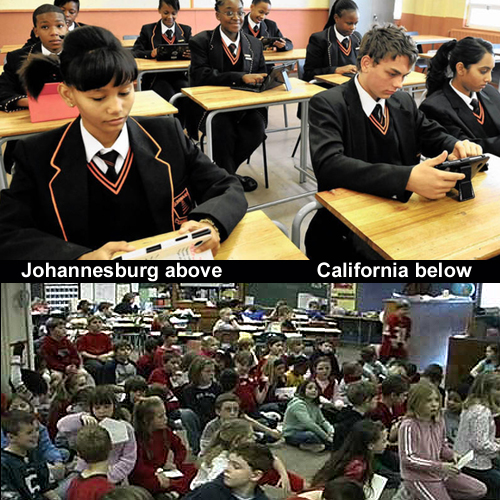 Better education does not come by rewarding school performance, according to an African study, but by rewarding the underlying causes of that performance.
Better education does not come by rewarding school performance, according to an African study, but by rewarding the underlying causes of that performance.
America’s method is not going to help it get better. Africa’s method is already helping it to get better, and quite fast, too.
Fifteen countries in sub-Saharan Africa fund a regional organization that evaluates those country’s educational system and produces recommendation for improvement. SAMEQ is essentially the Department of Education for sub-Saharan Africa.
Unlike our Department of Education the most recent comprehensive study of primary and secondary education suggests that teacher and pupil evaluations are meaningless and become entrenched without a broader and more detailed look at that data.
Let me explain:
The Obama administration focuses on school performance and teacher evaluation. What the SAMEQ report discovers is that while performance is the ultimate metric, giving funds or withholding funds based on that performance is pointless, which is what the Obama administration does.
SAMEQ delves into the causes of current performance, and I dare say that they’re the same the world over.
And this simple type of analysis leads to unfettered conclusions.
“Pupil socio-economic status, background, sex, age, grade repetition, absenteeism, homework, and speaking the language of instruction at home” are the greatest determinants of a pupil’s performance, and thereby, the pupil’s school’s overall performance.
(The report later reveals a tantalizing analysis of grade repetition that suggests this is counter-productive. In other words, poor pupils who were retained did poorer in the long haul than poor pupils who were retained and matriculated, anyway.)
And the main contributors to these individual factors are “school resources, school location, pupil–teacher ratio,” and finally, Obama’s focus, teacher evaluation (which the report calls “teacher score”). But it’s critical here to place teacher evaluation on no greater a pedestal than the other important factors.
The report adds that secondarily but still very important, school location seriously correlates with overall educational performance, and that is essentially a wider metric supporting the importance of socio-economic background.
So what does all this mean?
First, I have to say that the study was outstanding. Read the study to see the care with which data was mined, the finesse with with which contributing factors were parsed out, and the enormous relevance of carefully determined variants. Unlike our own government studies which tend to top-load a study with a goal (like school performance), this was a legitimate scientific exploration.
SAMEQ must tread much more carefully on political toes than our own government agencies, so there was little outright recommendation. But it’s there not just between the lines:
Pupils aren’t going to get better until their socio-economic status improves, and schools aren’t going to get better until pupils get better.
The one agreement with Obama policy is that teachers matter a lot, and that teachers can become as entrenched as socio-economic policy. Certainly figuring out a way to enhance teacher performance would be dynamite in improving education.
But so importantly, this must not be the principal concern.
What SAMEQ shows is that government resources – far more restricted in Africa than in America – are poorly used when thrown at the schools themselves.
Using the fact that grade repetition has no effect on student performance, SAMEQ explains further: “High levels of grade repetition have been blamed for increasing the overall cost of schooling, because if many pupils repeat each year, school systems need to employ more teachers and build more classrooms.”
Thus, attempts to work within the system can backfire.
SAMEQ is comfortable with certain remedies that would be not so comfortable in the U.S. “Home Intervention” as successfully implemented in Malaysia, and to a lesser degree in Mauritius and the Seychelles, improves performance.
This means greater funding of social work, something currently anathema in most of America.
And SAMEQ pulls no punches in recommending outright that more of Africa’s limited resources for education should be directed to poorer areas than richer areas.
That’s a direct opposite from America, where school resources are mostly local, so are circular and support themselves. Redistribution is what’s required.
As with immigration, taxation and employment policies, Africa is way ahead of America on educational reform.
And Africa is improving … fast. Is America?
“’Africa’ is way ahead of America on education reform”? Hardly.
This is something that I know about, after 40 years of starting and managing a US education company and serving as a consultant/evaluator for the largest of the 6 regional accrediting institutions in the United States. I have served for 8 years on a public elementary school board and currently serve on the board of a specialized, new model, high school operation. I have also visited elementary and post-secondary schools in West Africa, in Kenya and in South Africa. While I don’t dispute anything contained in the report that you reference, In my experience, there are crushing economic/social/cultural/financial issues that impede educational progress and reform throughout Africa.
Educational progress/reform today is being dramatically impacted by technological innovation, among other things. This is happening in the United States in very significant ways. It is happening in “Africa” in modest ways and only in certain areas. It is difficult to use current learning technology if there is limited access to electricity, modern computers and communication gear, etc.
There are lots of problems with the US educational system (and I am not an apologist for US education) but they pale in comparison with problems in the educational system(s) that is/are accessible by the majority of sub-Saharan Africans, outside of South Africa, perhaps.
Ronald L. Taylor
Co-Founder, Retired CEO, and Senior Advisor